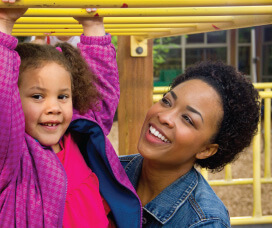Co-Parenting Success Is Based On A Healthy Mind-Set After Divorce
 By Rosalind Sedacca, CDC
By Rosalind Sedacca, CDC
Getting divorced and preparing for the responsibilities of co-parenting ahead? This facet of life after divorce can be enormously complex and challenging for several good reasons:
- Both parents are bringing the raw emotions resulting from the divorce into a new stage in their lives.
- Mom and Dad are also bringing previous baggage from the marriage – ongoing conflicts, serious disputes, differing styles of communication, unresolved issues and continual frustrations — into the mix as they negotiate a co-parenting plan.
- Both parents are vying for the respect and love of the children – and are easily tempted to slant their parenting decisions in the direction that wins them popularity with the kids.
- Anger and resentment resulting from the divorce settlement can impact and influence levels of cooperation in the years to come.
- Parents may disagree about major issues ahead that weren’t part of the parenting dynamic in the past including: visits and sleepovers with friends, scheduling after-school activities, handling curfews, new behavior problems, consequences for smoking, drinking and drug use, dating parameters, using the car and scheduling vacation time.
- Parents may not share values and visions for the children as they grow and may also not agree on the plan of action required to honor those values.
When these differing dynamics appear parents might find themselves struggling to find ways of coping. So keep this in mind: Agreement on how to co-parent effectively in the present and the future is not a one-time discussion. It takes on-going communication, both verbal and written as well as regular meetings via phone, email, online scheduling tools or in person. And it takes a commitment to make co-parenting work – because you both want and need it to!
The consequences, when it doesn’t work, can be considerable. Your children are very likely to exploit any lack of parental agreement or unity, pitting Mom and Dad against one another while they eagerly take advantage of the situation. This is a danger sign that can result in significant family turmoil fueled by behavior problems that neither parent can handle. See the headlines across all forms of media as examples of co-parenting done wrong.
When Mom and Dad are on the same page, so to speak, they can parent as a team regardless of how far apart they live. These parents agree about behavioral rules, misbehavior consequences, routine schedules and shared intentions regarding their children. They discuss topics of disagreement and find solutions they can both live with – or agree to disagree and not make those differences an area of contention.
If curfew in Mom’s house is 9:00 pm and it’s 10:00 pm in Dad’s house, that can still work if both parents respect the differences and let the children know it’s all okay. When differing curfews becomes an issue of major contention, that’s when the kids can get hurt – caught between battling parental egos. Children are confused and often feel guilty in battling parent situations, which rarely lead to any good within the family structure.
Keep in mind that when you’re more open and receptive to your co-parent, you are more likely to get what you really want in the end. Good listening skills, flexibility and the commitment to do what’s best on behalf of your children are part of a smart co-parenting mindset. Remember too that co-parenting will be a life-long process for the both of you. Why not do it in a way that will garner your children’s respect and appreciation? They will thank you when they are grown adults.
If you need help with one challenge or any array of co-parenting issues, engage my help through personal coaching or check out the many online coaching tools and programs I offer. They will all support you in making better decisions on behalf of your children and your long-term co-parenting success.
* * *
Rosalind Sedacca, CDC is the founder of the Child-Centered Divorce Network, a Divorce & Co-Parenting Coach and author of the acclaimed ebook, How Do I Tell the Kids About the Divorce? A Create-a-Storybook Guide To Preparing Your Children — With Love!To get her free ebook, coaching services, expert interviews, programs, e-courses and other valuable resources on divorce and co-parenting, visit: http://www.childcentereddivorce.com
Please share this article on social media!
© Rosalind Sedacca All rights reserved.
